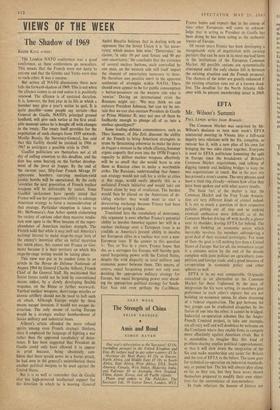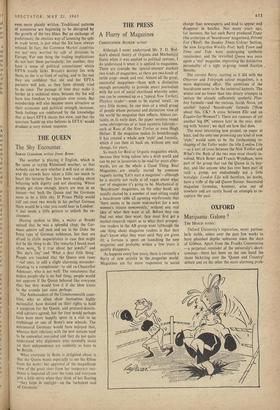EFTA Mr. Wilson's Summit
PAUL LEWIS writes from Brussels : The Common Market was surprised by Mr. Wilson's decision to turn next week's EFTA ministerial meeting in Vienna into a full-scale inquiry into relations with the Six, complete, so rumour has it, with a new plan of his own for bringing the two sides closer together. Everyone is used to EFTA politicians lamenting the split in Europe since the breakdown of Britain's Common Market negotiations, and talking of digging tunnels and building bridges to keep the two organisations in touch. But in the past this has proved a siren's course. The very phrases used have a tired ring already—witness how often they have been spoken and with what scarce results, The basic fact of the matter is that the Common Market and the Free Trade Associa- tion are very different kinds of animal indeed. It, is not so much a question of their respective policies getting out of step and so making eventual unification more difficult; as of the Common Market driving off with hardly a glance over its shoulder, leaving EFTA far behind. The Six are building an economic union which inevitably involves the members surrendering a good deal of their national sovereignty. For some of them the goal is still nothing less than a United States of Europe. But for all, the immediate target is a customs union by the end of the decade complete with joint policies on agriculture, com- petition and foreign trade, and a good measure of co-operation in economic ,policy and other spheres as well.
EFTA is in no way comparable. Originally conceived as an alternative to the Common Market for those frightened by the pace of integration the Six were setting its members give preference to each other's exports but are not building an economic union, let alone dreaming of a federal organisation. The gap between the two groups can be eradicated altogether by the fusion of one into the other; it cannot be bridged. Industrial co-operation schemes like the Anglo- French Concord project, to take one example, are all very well and will doubtless be welcome on the Continent where they enable firms to compete more effectively against American rivals. But it is moonshine to imagine that this kind of problem-sharing implies political rapprochement, or that it will slow down the integration of the Six and make membership any easier for Britain and the rest of EFTA in the future. The same goes for technical co-operation on industrial standards, say, or patent law. The Six will always play along so far as they can, but they have never shown themselves prepared to modify their own objec- tives for the convenience of non-members.
In trade relations the lessons of history are
even more plainly written. Traditional patterns of commerce are beginning to be disrupted by the growth of the two blocs. But an exchange of preferences, the obvious way of lessening the split in trade terms, is just what the Six have always refused. In fact, the Common Market countries are not very worried by talk of divisions in Europe. For one thing the trading implications do not hurt them particularly; for another, they have a sense of political commitment which EFTA totally lacks. Britain's destiny lies with them, as she is so fond of saying, and in the end they are confident that • she and her EFTA partners will join, as they have already tried to do once. The passage of time may make it harder in a technical sense, because the Six will have less freedom to negotiate over terms. But membership will also become more attractive as their economic and political strength increases. Such feelings are reinforced by the knowledge that at heart EFTA shares this view, and that the question 'hands up who believes in EFTA' would produce a very mixed response.































 Previous page
Previous page